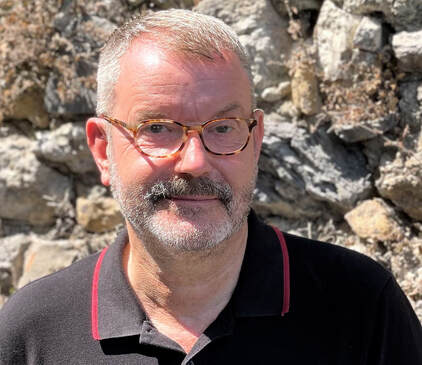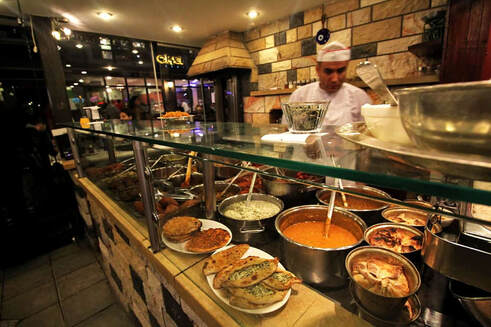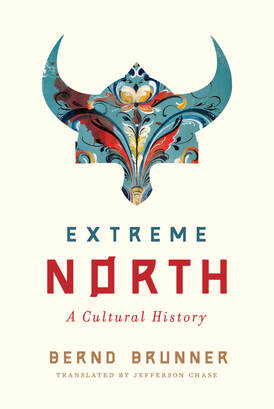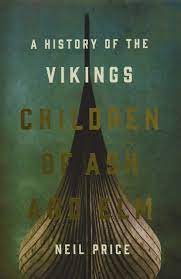|
Welcome Bernd! Thanks for taking some time to chat about writing. First, a few quick-fire questions: Skiing or surfing? Cats or dogs? And what is the farthest north you have ever traveled? Skiing, but preferably cross-country which can sometimes turn into downhill-skiing. Dogs! The North Cape in Norway. Flying over Iceland, Greenland, and further North doesn’t count. "Skiing, but preferably cross-country which can sometimes turn into downhill-skiing." Many of us (myself included) have longed to travel to distant places these past two years. You divide your time between Istanbul and Berlin, so can you give readers your top restaurant or cafe recommendation for both cities? For Istanbul it’s Çiya Sofrası, located in Kadıköy on the Asian or Anatolian side as Turks say. Two coffee places for Berlin, if you allow, very different in character: Café Savigny in Charlottenburg (rather cozy, some outside seating, with many newspapers) and Café Einstein in Tiergarten (old villa, Viennese style, very nice summer garden). Few writers struggle to start books and almost every one I know of struggles to finish them. As a prolific writer of non-fiction who has completed a number of books, what do you think the key to finishing a book is? Are there any habits, strategies, or frameworks that have helped you reach the end? Writer’s block is not really part of my experience. I never had to force myself and mostly had tight deadlines from my editors which helped. The expectation to see the book in print, my impatience, really helped. In retrospect, I wish I had taken more time with some of the books, just to enjoy the time spent with them more. I more or less see all of them as “research projects”, even though they didn’t result in academic books. Topics explored in your books include the cultural history of orchards, human fascination with birds, and even such concepts as night and winter. As many writers of fiction (I am thinking either historical or science fiction specifically) struggle to feel ‘qualified’ enough to write to this level of depth and accuracy, what advice do you have for writers who want to write like experts in a particular field? I hope I don’t come across with an expert’s attitude. I often see myself as mediating between experts and a readership that’s interested in a particular, popular topic. It’s really important to have a competent editor and one or two experts from the field who can check books for accuracy before they go into editing. For university presses this is common practice, as you may know. So I recommend that writers connect with a researcher in the field who may not have the time or inclination to write a popular, non-academic book him or herself and is happy to comment. "I often see myself as mediating between experts and a readership Extreme North, your most recent publication, has been described as a cultural “cabinet of wonders” as you explore the northern cultures that gave rise to both historic and popular myths about the north. What drew you to this topic and do you feel you achieved what you set out to accomplish? In part, it developed from my work and book on the experience of winter across the ages titled Winterlust. My travels in Scandinavia, the study of the Swedish language, an interest in history and in the making of myths or fictions also play a role here. Without having all these images and memories from my trips this book wouldn’t have been possible or turned out very differently. I wanted to pull different threads together, most importantly the connection between Romanticism, anti-semitism, and the fictions of white supremacy and ‘Nordic’ superiority. Extreme North is not a cultural history of the Northern cultures themselves, which would easily have filled a thousand pages, but the ways in which ideas about “the North” have been appropriated and instrumentalized for other purposes. And yes, I’m really quite satisfied with the result and the reactions to the book have been mostly positive so far, but I’m not saying that the story is ‘complete’ or couldn’t have been told in other ways. "Extreme North is not a cultural history of the Northern cultures themselves, which would easily have filled a thousand pages, but the ways in which ideas about “the North” have been appropriated and instrumentalized for other purposes." One of the central threads in the book is how these northern myths have been used to justify racist and eugenic ideologies that still pervade Western culture today. As a writer who draws great personal and creative inspiration from the myths, I find this both heart-breaking and critical to address every time this comes up in conversation. My question for you is this: what is your message for creatives who draw from this intriguing and often problematic body of myths? This is a very important question, but I’m not sure if I have a satisfying answer. I think it’s important to keep in mind that these myths have been passed on from generation to generation, sometimes across language barriers and certain religious filters. So I would not see them as absolute truths, there always remain some questions. I’m skeptical when someone tells me that this is how it “really” happened. There are some really interesting books that tackle history from a more scientific or anthropological point that may help to put things in perspective. Please let me recommend Neil Price’s Children of Ash and Elm. Everybody has to decide for himself or herself how far to go with using the stories and myths. I don’t feel like being in a position to tell people what they should do. At the risk of asking too grand a question, what would you say is the greatest gift that cultures of the north have to offer the rest of the world? If we refer to the indigenous cultures of the North, I find astonishing how well, over several thousand of years, they adapted to a really challenging environment and climate. If we talk about non-indigenous Scandinavian culture, I’m impressed by the high standards of education, health care and social welfare in general - the ‘Nordic’ model, even though I’m aware that there are some cracks in the system. There is also a sense of being in touch with nature and enjoying the outdoors as well as the comfy indoors that I see in many Scandinavians and that I find adorable - in particular, concepts such as friluftsliv and hygge. Not sure if it belongs here, but I’m a big fan of the Danish movie directors Susanne Bier and Thomas Vinterberg (and their films). And of actors such as Paprika Steen and Mads Mikkelsen! Last, but not least, where can readers find a copy of Extreme North? And where can they discover your other publications? My friend Brendan from New York told me that you can find it on the table with “notable nonfiction” at the fabulous Strand Bookstore. Or any other bookstore where you may have to order it. Also for the other books. Discover more from Bernd Brunner by visiting his website!
0 Comments
|
AuthorJoshua Gillingham is an author, editor, and game designer from Vancouver Island, Canada. Archives
April 2022
Categories
All
|





 RSS Feed
RSS Feed
